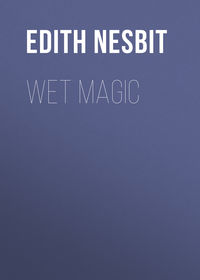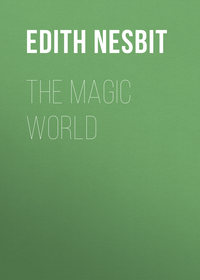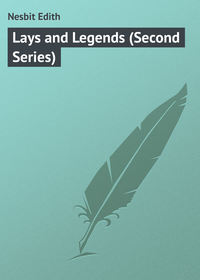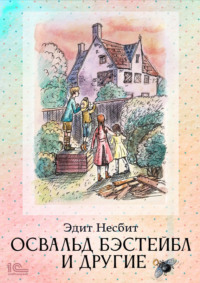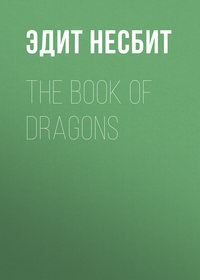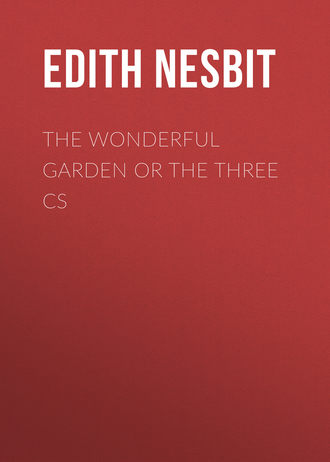 полная версия
полная версияThe Wonderful Garden or The Three Cs
‘I’ve thought of something better than straw,’ he said, when he and William and the leopard skin were alone together in the harness-room. And William, when the new thought was explained to him, slapped his leg harder, and laughed more thoroughly than before.
Rupert had only just entered the secret passage, his first match had just gone out, when he heard the children at the other end. He went towards them, fully meaning to explain what sort of leopard he was, and what sort of joke – he called it a joke to himself – he and William had arranged to play upon Poad. But when he heard them speak, and saw the showers of leopard’s-bane fall on the flags of the passage, he, as he put it later, ‘played up.’ And when the children had gone, he laughed softly to himself and began to think what would be the best spot in the tunnel to wait for Poad in. He had noticed, by the light of that first match, an arched recess, the one, you remember, where the children stored their sacks of wet rose leaves the night they played at Rosicurians and cured Rupert. He would hide in this, and then, when Poad came along, he would jump out at him with that snarl which had sounded so well when he met the children.
He waited till the garden door was locked, and then felt for his matches. He could not find them. He must have dropped them when he was pretending to the children. He felt along the floor, but there were no matches to be found. Never mind, he could feel his way in the dark. He knew exactly where the arch was. To the left, about three-quarters of the way down the passage. He stood up and laid his hand upon the wall, walked forward till he felt the corner of the recess, and stooped to curl himself up in it and wait for Poad. He put his hand out to steady himself as he sat down, and his hand touched, not the stone floor, but soft warm fur. And not dry hard fur like that which he himself wore, sewn tightly round him with harp-strings, but living fur, on a living creature. He drew back his hand, and a cold sweat of horror broke out on his forehead, and the little hairs on the back of his neck seemed to move by themselves. His hand still felt the dreadful warm softness of that fur. It almost seemed to him that he had felt the spots on it.
‘Oh, I wish I hadn’t!’ said Rupert to himself, as so many of us have said when it was too late to say anything. ‘Oh, I wish I hadn’t!’
He stood perfectly still in the mockery of his sewn-on leopard skin, waiting for the real leopard to move, or to settle down. Perhaps it would settle down? The leopard must have crept in when the door into the garden was opened in readiness for the children to pass through. It must have gone to sleep there, and perhaps he had not roused it.
‘Oh, why didn’t I go with the others?’ Rupert thought. And then a good thought came to him.
‘If I had,’ he told himself, ‘I should have been out there, and they wouldn’t have met me and turned back, and then they might have found the real leopard, and it might have jumped on them. I’m glad it’s only me.’
This good thought came to him as he rose up and steadied himself by the wall. Then in an instant all thoughts were drowned in a flood of terror, and Rupert found himself almost running, feeling his way by the wall towards the house entrance. If he could only get out before the leopard was up and after him! He reached the end of the passage. The door at the foot of the stairs was shut and locked. He was alone there in the dark with a locked door at each end of the passage. He crouched down by the door. In spite of his agony of fear he had enough sense not to beat on the door and scream for help, which was, of course, his first mad impulse.
‘Keep quiet,’ he kept telling himself, ‘some one must come soon. If you keep quiet, the leopard will go on sleeping, perhaps. The children will open the garden door when they hear the dinner-bell. Then you can get out. If you make a row, the leopard will wake up and come for you.’
So he crouched and waited. But no one came. Then suddenly he remembered. When the children heard the dinner-bell they would come down the passage. They would find the real leopard. It would certainly wake. His own feelings about the leopard now made him certain that the children, when they were safe in the sunshine, would see that what talked to them, dressed in a leopard’s skin, could only have been a human being dressed up. Most likely they knew already who it was. So they would come back without fear – come back to find him, Rupert, and would find that!
Then Rupert did what was really an heroic thing. He stood up, and, as quickly as he could, began to feel his way back along the side of the passage farthest from the arched recess. He would go to the garden door, and when the children opened it, he could prevent their coming in. To do this he must pass the leopard.
A warm delicious glow stole through him. This was worth it. Better than crouching like a coward at the far side and letting those children come laughing and talking down the passage to meet that, savage from a sudden awakening. He took off his boots, and crept quietly along. No sound broke the black silence. He reached the flight of steps, reached the other door, sat down on the top step and waited.
Nothing had stirred in the silence.
‘Anyhow,’ said Rupert, ‘I feel safer at the top of the stairs than at the bottom.’
Rupert will never know how long he sat there in the darkness. The cracks in the door which showed as pale vertical streaks were his only comfort. He tried to get off the leopard’s skin, but the harp-strings were too strong. It seemed to him that he had been there a week.
There were voices, many voices, Charlotte’s voice high above the others. Rupert hoped the leopard was too far away to hear, but how could he know where the leopard was? It might have crept quite close to him on its padded noiseless feet, and he would never have known. It might be within a yard of him now.
Rupert understood in that hour what sort of practical joke it was that he had prepared for the policeman.
‘Because, of course,’ said Rupert, ‘I should have been just as dreadful for Poad as that is for me. He’d have thought I was It.’
The voices and footsteps came nearer. They were talking outside.
‘Best shoot it, when it rushes out at us. I’ve got a revolver,’ said Poad. And a cold shiver ran down Rupert’s back. Suppose he had met Poad alone in that dark passage as he had planned?
‘Let me get at him with the garden fork,’ said another voice – the gardener’s.
Then another, a strange voice this time:
‘Don’t hurt the beast. It’s valuable. An’ it’s tame, don’t I tell you? You leave be. Stand back. I’ll tackle him.’
Rupert wretchedly wondered how he was to be trapped; also, how near the real leopard really was. He decided that a little noise more or less couldn’t matter now. He tapped at the door and cried, ‘Let me out. It’s Rupert.’
But his words were drowned in the chorus of alarm that rose when he knocked at the door. And the leopard? In the midst of the babel of voices a bolt was drawn, the door opened. Rupert sprang out and turned to shut the door. But his feet and arms and head were entangled in strings, and he fell to the ground.
‘It’s me; it’s Rupert,’ he shouted; ‘shut the door! The real leopard’s inside!’
‘Why!’ said the leopard’s owner – he who had thrown the net over Rupert – ‘it’s a beastly boy, dressed up.’ He spoke in tones of deep disgust.
There was a crowd of people. The three C.’s had managed to scale the wall by means of a pear-tree. They had brought back William – a prey to secret laughter, and the leopard’s owner, and a dozen other people. A score of hands helped to loose Rupert from the net.
‘Oh, I don’t know. I did it for a lark. To take a rise out of some one. But I’ve been paid out. The leopard’s in there. I touched it, in the dark.’
Sensation!
‘There,’ said William to the policeman, ‘I told you half an hour ago there was a good chance the beast ’ad taken cover in the passage, and you would have it you see his tail up a tree somewhere, and wouldn’t go down.’
‘I certainly thought I see ’is tail,’ said Poad, scratching his ear; ‘and this gentleman’s pal and half a dozen others is after ’im now, down by the other lodge. But perhaps it wasn’t really ’is tail. In fact, it couldn’t be, if the animal’s in here like what the young gentleman says it is.’
‘I tell you the leopard’s in here, now,’ said Rupert. ‘Oh, get me out of this beastly skin somebody.’
William unlaced him, and he stepped out, a pale boy in shirt and knickerbockers.
‘In there now, is he?’ said the leopard’s keeper, rudely taking no notice of Poad; ‘then if some one’ll get a lantern or two we’ll go in and get him.’
Some one got a lantern or two – it was William in point of fact; the lanterns happened to be ready in the summer-house.
The keeper went down the steps.
‘On the right-hand side?’ he said, quite unconcernedly.
And Rupert said, ‘Yes, to the right.’
William and three other men followed warily, but to most of the party it seemed best to remain by the door. Five people and a net were surely enough to catch one leopard. But every one crowded round the door, and some even went down a few steps, bending over to catch the first sounds of anything that might be happening.
All of a sudden a sound came from the dark passage below, and the listeners started back – a strange sound, the sound of long, loud laughter. It echoed and re-echoed through the vaulted passage, coming nearer and nearer. The crowd drew back.
Out came the leopard keeper, laughing, with his net; out came William, laughing, with his pitchfork; out came Poad, half laughing and half angry.
‘What is it? what is it?’ said every one outside. And for a moment none of those inside could get breath to answer.
‘What is it?’ they asked again, and at last William answered:
‘Mrs. Wilmington’s old cat! Gone in there to have her kittens in peace away from the children. They’ve caught your little bit all right,’ he said to the leopard keeper. ‘Look!’ He pointed to something white among the trees beyond the wall. ‘I told Bill to run up a signal if they found the rest of him where Poad said he’d seen his spotted tail.’
‘Did you know that before we went in?’ Poad asked sternly.
‘’Course I did,’ said William, his hands on his knees and his ruddy face deeply creased with the joke. ‘You wouldn’t have catched me going in there without I’d known where my Lord was, him and his spotted tail. I thought it was Master Rupert up to some more of his larks, I did. I wasn’t a-going to spoil sport.’
‘You ’aven’t ’eard the last of this,’ said Poad huffily.
‘No more ain’t you,’ said William, ‘so don’t you think it, James Poad. You that believed one tale when you’d seen the other. You that wouldn’t believe the sworn evidence of your own eyes and a spotted tail.’
CHAPTER XIX
F. OF H.D
You will hardly be able to believe that, owing to the firmness of Uncle Charles’s instructions that he was not to be disturbed on any pretence, the whole noisy affair of the two leopards passed entirely unnoticed by him. The three C.’s did not tell, because they feared that Rupert’s impersonation of the leopard might not be pleasing to the Uncle. Mrs. Wilmington did not tell, because Rupert was her great favourite. She mended the places where the harp-strings had torn the leopard skin, and put it back in its place and said nothing to any one. William did not tell; he was a man who could keep a joke to himself, was William. Poad did not tell, because he never could be quite sure whether the laugh was on his side or on William’s. And Rupert did not tell, for reasons that will be clearer later on. So the Uncle went on writing his book about Sympathetic Magic, in complete ignorance of anything leopardish having happened.
When all the fuss and bustle had died down, and Rupert and the children were left face to face, words of reproach rose to every lip. But Rupert, knowing what he had faced in that underground passage for the sake of the children, still had enough of the warm and comforting feeling to be able to say:
‘Look here, don’t! I’m awfully sorry if I did really frighten you. I didn’t know. I’d no idea what it would feel like to be frightened by a leopard until I thought I was shut up with one. Don’t rub it in; there’s good chaps.’
A frank appeal such as this could not fail with the three C.’s, and if anything had been needed to melt the anger of the girls, being called ‘good chaps’ would have supplied that need.
‘Oh yes,’ they said, both together. ‘But do let’s tell each other all about it,’ Charlotte added. ‘Let’s not say anything till after dinner, and then have a grand palaver in the garden. I do want to understand just exactly what you felt when you felt the leopard, Rupert, to see if it was anything like what we felt when we saw your spots.’
‘All right!’ said Rupert.
And Charles said, ‘It was the most dreadful thing in the world, but it will give us something to talk about.’
It did. Rupert’s hidden consciousness of having done something ‘rather decent,’ made him quite like the self that he had seemed to be on the first night. The children spent a most enjoyable afternoon, and for the first time for many days, Rupert did not seem anxious to get rid of the others. He even invited them to come down to the river and see him dive.
‘Though I’m not a patch on Mr. Penfold,’ he said.
They went. And Charles had his first swimming lesson.
‘It would be all right,’ he said, sleeking his wet hair as they went home, ‘if only you could remember which are your arms and which are your legs. I never can, in the water, and, anyhow, you seem to have far too many, and they all feel as though they belonged to somebody else.’
As they went over the bridge, Mr. Penfold said:
‘I’ve done that translation, and I’ve had it typed. So you can tell your uncle about it and present it to him. He’ll like it awfully, I know. And I daresay he’ll let you have a copy of the translation. I’ve had one done expressly for you, with the parts that wouldn’t be of any advantage to you left out. By the way, there’s something written in the end about the seventh of July. That’s to-morrow. So you’d better present it then.’
There was a chorus of thanks, and the presentation was arranged for the next day. The children took the old Latin book home with them. Mr. Penfold was to bring the translation; ‘when I’ve corrected the spelling and the stops,’ he said. ‘I’ll come, if I may, and see the presentation. There should be flowers, too, I think, symbolic flowers, suggested by your other book.’
When the children got home they spread the Latin book on the table in the window, to catch the last rosy sunset light, and Charles said with proud affection:
‘Now, Rupert! We don’t want any old translation when you’re here.’
Rupert frowned, and the girls shrank as sensitive plants shrink when a finger touches them. They knew the sort of bitter thing about its not being worth while to do things for kids, which seemed to be trembling on Rupert’s lips. But quite quickly his face changed. He turned red – or was it only the deepened red of the sunset? – and said:
‘You know, I’m afraid I’ve kidded you rather about my Latin. I’m not very good at it as a matter of fact. I’ve only just begun Virgil.’
‘But you do know a lot. You’re always saying bits of it,’ said Charles anxiously.
‘That was swank,’ said Rupert strongly; ‘silly swank. It was all wrong, I expect. There, now it’s out!’
The children treated Rupert with added respect.
‘How splendid of him to own up about the Latin,’ said Caroline over the hair-brushing. And Charlotte reminded her sister that she had always thought Rupert splendid, which was not true, though she thought it was.
But this was later. At the moment, ‘Never mind,’ said Charlotte, ‘we shall have the translation to-morrow, and we’ll try a spell at once. I’m sorry the leopard that spoke was only you, Rupert. We did think you’d have to believe in spells after that.’
‘There’s something written at the end,’ said Caroline, who was still examining the book; ‘I’d forgotten about that.’
And there was. In very faint brown ink. They had to carry it quite outside the front door (which was, as you know, at the side), to get light enough to be sure that they could not read it because it was written in Latin. And when they did get enough light, they saw that it was in English, and that they could. The writing ran:
‘On the seventh day of the seventh month, and at the seventh hour, let the seed be sown. Seven seeds and no more for the one sowing. In the garden of peace let them be sown, which same is the seventh garden of the world. Let him that would sow, take heed to bathe him seven times in fair water, and let him sow with his face set eastward, with silence at the lips and, at the heart, faith in all good things and the love of all things beautiful. After seven weeks the blossom shall appear. Then let him who sowed the seed eat of the flower. The seed of the F. of H.D.’
‘What?’ cried Rupert.
‘That’s all,’ said Caroline; ‘it stops short like that. There isn’t any more.’
There had been more, but some one had scratched the rest out.
‘With a knife or scissors,’ explained Caroline. ‘Oh, what a pity!’
‘I say,’ Rupert was beginning, but Charles interrupted.
He had stooped to look up under the page that Caroline was fingering. ‘There’s some more; look, turn over!’
There was.
‘Until it be granted none knoweth his heart’s most dear desire. But after it is granted he perceiveth that so and not otherwise was and must ever have been the true Desire of the Heart.’
‘That’s true, at any rate,’ said Charlotte. ‘I was just wondering what my heart’s desire really was. Suppose you thought it was going to be a new paint-box, but the flower knew better, and it turned out that elephants was what you really wanted?’
‘No, but I say,’ said Rupert hurriedly, ‘look here! You know I don’t believe in magic. I’d like to, really I would. But I found something. You’ve got the key of the drawing-room. I believe I know where those seeds are.’
The drawing-room was almost dark when they got there. Just one last ray of dusky gold lay across the room; it struck the round mirror and was reflected with dazzling brightness on some golden object at the end of the room. ‘The harp!’ whispered Rupert. ‘How queer, because it was exactly there – ’
It was still exactly there. And every one was quite sure that this little round box held the seeds of which the book told.
‘See,’ said Charlotte, holding them in the ray of yellow light; ‘they’re shaped like hearts, and they’re pink like wishes. I know wishes are pink. They must be some colour, and why not that?’
‘But ought we to take them?’ was the blighting question of Caroline.
It was settled by a note which Harriet obligingly carried to the Uncle.
Dearest Uncle – There are some pinky seeds in the drawing-room. May we have seven to sow?
And the answer was:
Certainly. Seventy if you like. – Your
D.S.T.U.So, very early next morning they got up. Bathing seven times is no joke, especially when you dry thoroughly between, and this Caroline conscientiously insisted on. ‘We must be quite sure we get it quite right,’ she said.
The four children met, by appointment, at the top of the stairs and crept down in silence. They went out by the French window which had once admitted Rupert. When they were outside, he said, ‘I bathed seven times too, because Charles did nothing but bother. But it’s no good my sowing the things, even if it’s all true. Because I haven’t faith in my heart, or my head either. I think really it’s the head’s fault.’
‘Oh, never mind your head,’ said Charlotte; ‘we’ll all sow one each, and the three over we’ll put in all together – all of us.’
The grass was still dewy-wet, but the gardener was at work in the Wonderful Garden. The children went through the ancient formula of ‘ena dena dina dus,’ to decide who should approach him, and the lot fell on Charlotte.
‘Please,’ she said, ‘may we have a bit of garden for our own?’
‘Ay,’ said the gardener, pointing to a vacant plot near the arbour.
‘Oh, thank you,’ said Charlotte, ‘but mayn’t we have a bit in the garden of peace?’
‘Who learned you to call it that?’ the gardener asked, looking at her strangely.
‘It’s the right name, isn’t it?’ Charlotte asked with sudden anxiety.
‘It’s the right name right enough,’ he admitted.
‘We want a bit that won’t be disturbed for seven weeks,’ Charlotte explained, and he looked at her more strangely than ever.
‘Sure you’ve got the right seed to sow?’
Charlotte opened her hand and he stooped and looked at it. Then he stood up and saluted like a soldier.
‘Why – ’ said Charlotte, ‘you – what do you mean?’
‘Nothing!’ he said, straightening his back; ‘only I worked here all my days, and my father afore me, and his father afore him, and so on back. You can see our names on the stones in the churchyard, same as you see Master’s people’s names on the tombs inside of the church. I’ll find a corner for you, my dear, and no one shan’t disturb the seed, once you’ve set it. You know how it’s done? No chatter, and which way to look?’
‘Yes, I know,’ said Charlotte, ‘but how do you know?’
‘Old man’s tales,’ he said; ‘old man’s tales,’ and led the way to the terrace.
‘Would you like to sow one of them?’ said Charlotte eagerly. ‘I know the others won’t mind if you would. Would you?’
‘Not me, my dear,’ said the old man, and he sighed. ‘Years agone, I don’t say. But not now. I’m old, you see. I ain’t got no heart’s desires nowadays except what I’ll get in the way of nature and in the Lord’s good time. You go along and set your seeds. I’m glad I seen ’em though. Over yonder, between the lupins and the larkspurs. That’ll be your plot, and I’ll mark the place.’
Charlotte, very much impressed, beckoned the others. In silence they sowed the seed. The gardener watched them, and when they had planted the seeds and covered them over, he took a pencil and a painted slip-label from his pocket, wrote on it and stuck it in the ground. The children stooped to read what he had written.
‘F. of H.D.’ it said.
‘Well!’ said Caroline.
‘Least said, soonest mended,’ said the gardener. ‘I shouldn’t wonder if seed leaves was to break ground in seven days. It was allus a wonderful garden, this was,’ he said, and turned to his work.
‘Well!’ said Charlotte again, and they went back through the dewy park.
After breakfast the Language of Flowers was earnestly consulted.
‘It’s no use going on thinking and talking about the F. of H.D.,’ said Caroline, when they had talked of nothing else for an hour and a half. ‘What we’ve got to do now, is to find the right flowers for the presentation.’
An hour’s earnest study of Miss Peckitt’s invaluable present yielded an interesting list. ‘Learning’ had apparently no floral emblem, so blue salvia, which means ‘Wisdom,’ was chosen to represent it. It was felt that on an occasion of this sort it was impossible to have too much of a good thing, so twelve flowers were chosen, and all but one, an outsider called circæa, which means a spell, of which the gardener had never heard, were found in the Wonderful Garden.
Rupert prevailed on Mrs. Wilmington to open the drawing-room on the ground that the clergyman was coming to tea, and she even agreed to allow the floral tributes to be arranged on a large table in that hallowed sanctuary, only insisting that a linen drugget should be laid down before so much as a blade of grass was carried in.
The drugget, white with many a washing, only seemed to add to the festival air which the drawing-room soon began to put on.
‘Talk of magic,’ said Charlotte; ‘what is it if it’s not that with Mrs. Wilmington? Rupert can drive her with a rein of darning cotton.’
Mrs. Wilmington had indeed consented to ‘do’ the vases on the mantelpiece and cabinets, ‘rather than have you children smashing everything to atoms,’ she said, and even, at Rupert’s request, had agreed to put only the flowers he handed to her. ‘Though a shabbier lot,’ she said, ‘it was never my lot to beheuld. More like a passel of weeds, I should say.’
The selected flowers were certainly none too showy. And the drawing-room decorations might perhaps have, in the end, looked what Mrs. Wilmington called ‘mingy,’ if Charlotte had not suddenly remembered that the rose, as the flower of secrecy, was entitled to be present, in, as she said, ‘the richest profusion.’


